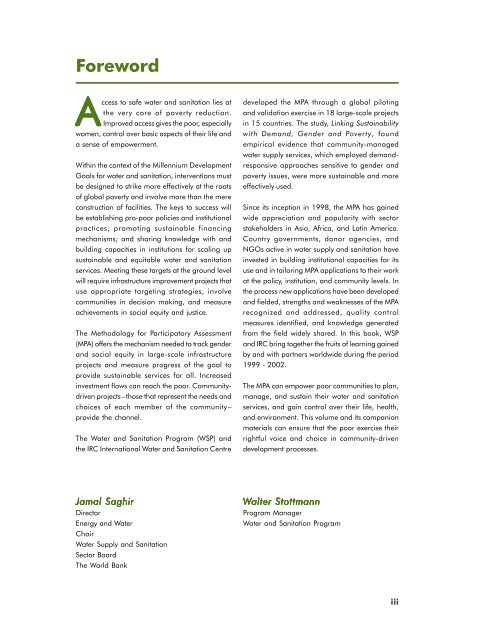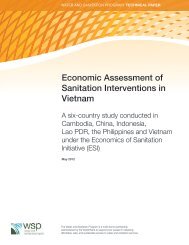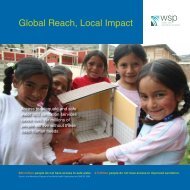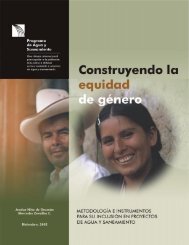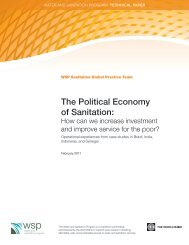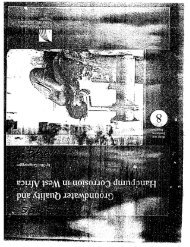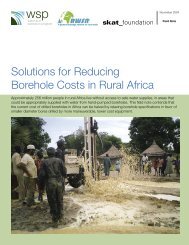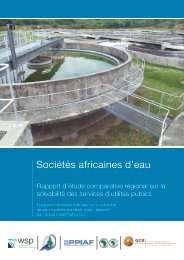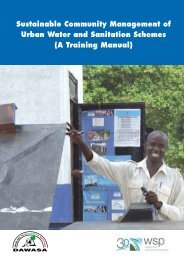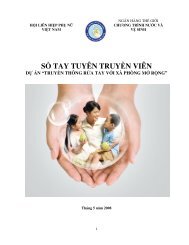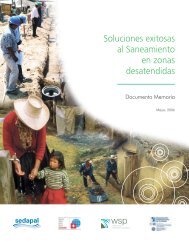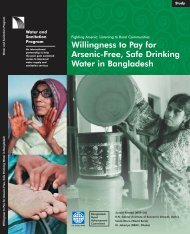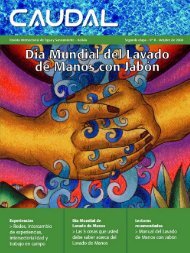Sustainability Planning and Monitoring
Sustainability Planning and Monitoring
Sustainability Planning and Monitoring
- No tags were found...
Create successful ePaper yourself
Turn your PDF publications into a flip-book with our unique Google optimized e-Paper software.
ForewordAccess to safe water <strong>and</strong> sanitation lies atthe very core of poverty reduction.Improved access gives the poor, especiallywomen, control over basic aspects of their life <strong>and</strong>a sense of empowerment.Within the context of the Millennium DevelopmentGoals for water <strong>and</strong> sanitation, interventions mustbe designed to strike more effectively at the rootsof global poverty <strong>and</strong> involve more than the mereconstruction of facilities. The keys to success willbe establishing pro-poor policies <strong>and</strong> institutionalpractices; promoting sustainable financingmechanisms; <strong>and</strong> sharing knowledge with <strong>and</strong>building capacities in institutions for scaling upsustainable <strong>and</strong> equitable water <strong>and</strong> sanitationservices. Meeting these targets at the ground levelwill require infrastructure improvement projects thatuse appropriate targeting strategies, involvecommunities in decision making, <strong>and</strong> measureachievements in social equity <strong>and</strong> justice.The Methodology for Participatory Assessment(MPA) offers the mechanism needed to track gender<strong>and</strong> social equity in large-scale infrastructureprojects <strong>and</strong> measure progress of the goal toprovide sustainable services for all. Increasedinvestment flows can reach the poor. Communitydrivenprojects–those that represent the needs <strong>and</strong>choices of each member of the community–provide the channel.The Water <strong>and</strong> Sanitation Program (WSP) <strong>and</strong>the IRC International Water <strong>and</strong> Sanitation Centredeveloped the MPA through a global piloting<strong>and</strong> validation exercise in 18 large-scale projectsin 15 countries. The study, Linking <strong>Sustainability</strong>with Dem<strong>and</strong>, Gender <strong>and</strong> Poverty, foundempirical evidence that community-managedwater supply services, which employed dem<strong>and</strong>responsiveapproaches sensitive to gender <strong>and</strong>poverty issues, were more sustainable <strong>and</strong> moreeffectively used.Since its inception in 1998, the MPA has gainedwide appreciation <strong>and</strong> popularity with sectorstakeholders in Asia, Africa, <strong>and</strong> Latin America.Country governments, donor agencies, <strong>and</strong>NGOs active in water supply <strong>and</strong> sanitation haveinvested in building institutional capacities for itsuse <strong>and</strong> in tailoring MPA applications to their workat the policy, institution, <strong>and</strong> community levels. Inthe process new applications have been developed<strong>and</strong> fielded, strengths <strong>and</strong> weaknesses of the MPArecognized <strong>and</strong> addressed, quality controlmeasures identified, <strong>and</strong> knowledge generatedfrom the field widely shared. In this book, WSP<strong>and</strong> IRC bring together the fruits of learning gainedby <strong>and</strong> with partners worldwide during the period1999 - 2002.The MPA can empower poor communities to plan,manage, <strong>and</strong> sustain their water <strong>and</strong> sanitationservices, <strong>and</strong> gain control over their life, health,<strong>and</strong> environment. This volume <strong>and</strong> its companionmaterials can ensure that the poor exercise theirrightful voice <strong>and</strong> choice in community-drivendevelopment processes.Jamal SaghirDirectorEnergy <strong>and</strong> WaterChairWater Supply <strong>and</strong> SanitationSector BoardThe World BankWalter StottmannProgram ManagerWater <strong>and</strong> Sanitation Programiii


